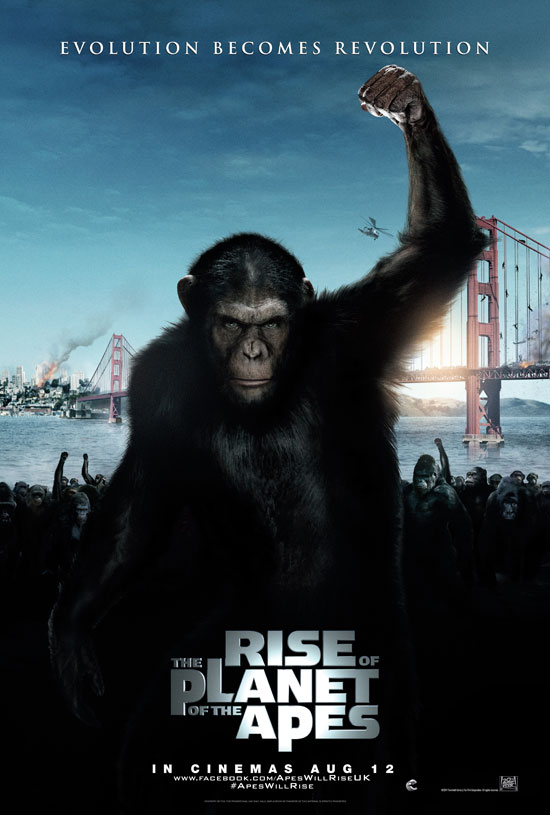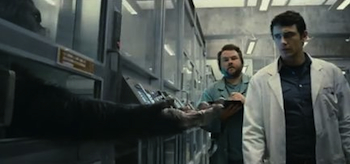
This is How It All Began, that is to say, a reboot of a remake, the latter being Conquest of the Planet of the Apes directed by J. Lee Thompson (1972).
Besides this we have - in cinematically chronological order: 'Planet of the Apes' (Franklin J. Schaffner, 1968), the groundbreaking first film about the intelligent apes having taken over the Earth in a distant future, all this discovered by two astronauts crash landing with their spacecraft on an 'unknown planet' when on a mission.
This film was followed by 'Beneath the Planet of the Apes' (Ted Post, 1970); 'Escape from the Planet of the Apes' (Don Taylor, 1971); 'Conquest of the Planet of the Apes' (J. Lee Thompson, 1972, mentioned above); 'Battle for the Planet of the Apes' (J. Lee Thompson again, 1973) and finally the less succesful remake of 'Planet of the Apes' (Tim Burton, 2001).
All these films directly or indirectly discuss and challenge our self-understanding as human beings:
Are we actually the most intelligent species on Earth, if seen in a more diversified way than the almost canonical scientifical outlook? What is intelligence? Is it intelligent behaviour to live the way most people do in the so called developed countries, polluting the environment, using violence on different levels, killing people, animals and plants, everything in the quest for power and money?
Do we treat animals as they ought to be treated and specifically discussed in this film the question:
Do we have the right to use animals as research objects, subjecting them to often very painful experiments in our quest for new medical treatments?
It starts with three chimpanzees being captured in an African jungle, shipped to San Francisco, where they will be used as guinea pigs in a research project where the scientists try to find a cure for Alzheimer's disease.
Besides this we have - in cinematically chronological order: 'Planet of the Apes' (Franklin J. Schaffner, 1968), the groundbreaking first film about the intelligent apes having taken over the Earth in a distant future, all this discovered by two astronauts crash landing with their spacecraft on an 'unknown planet' when on a mission.
This film was followed by 'Beneath the Planet of the Apes' (Ted Post, 1970); 'Escape from the Planet of the Apes' (Don Taylor, 1971); 'Conquest of the Planet of the Apes' (J. Lee Thompson, 1972, mentioned above); 'Battle for the Planet of the Apes' (J. Lee Thompson again, 1973) and finally the less succesful remake of 'Planet of the Apes' (Tim Burton, 2001).
All these films directly or indirectly discuss and challenge our self-understanding as human beings:
Are we actually the most intelligent species on Earth, if seen in a more diversified way than the almost canonical scientifical outlook? What is intelligence? Is it intelligent behaviour to live the way most people do in the so called developed countries, polluting the environment, using violence on different levels, killing people, animals and plants, everything in the quest for power and money?
Do we treat animals as they ought to be treated and specifically discussed in this film the question:
Do we have the right to use animals as research objects, subjecting them to often very painful experiments in our quest for new medical treatments?
It starts with three chimpanzees being captured in an African jungle, shipped to San Francisco, where they will be used as guinea pigs in a research project where the scientists try to find a cure for Alzheimer's disease.
 At the pharmaceutical company Gen-Sys we meet scientist Will Rodman (James Franco) who is trying to develop a cure using genetically engineered gene thereapy on chimpanzees.
At the pharmaceutical company Gen-Sys we meet scientist Will Rodman (James Franco) who is trying to develop a cure using genetically engineered gene thereapy on chimpanzees.This howeer leads to a mutation among the chimpanzees, giving some of them a human level of intelligence and during one of these tests a female ape runs amok during a board meeting where Rodman is presenting his positive results.
After this incident, his boss, Steven Jacobs (David Oyelowo) order chimp handler Robert Franklin (Tyler Labine) to "put all the chimpanzees down."
Franklin can't kill a baby chimp the female has given birth to, wherefore he gives it to Will, who nurtures him at home.
When arriving at his home we realize why Will so hard is trying to find a cure to Alzheimer's:
His father, Charles (John Litgow), is gradually disappearing into the void and this is very troubling for Will. Charles however take good care of the chimpanzee and he also gives it the name Ceasar.
After this a number of events leads to the point where Will have to leave Ceasar at a sort of 'daycare center' for apes and there he - and the other apes - are treated very bad by a young man with sadistic tendencies.
This takes place after Will having had Ceasar for five years at home and gradually stimulated him to the point that he now is able to perform relatively complicated manoeuvres.
Gradually Ceasar becomes the leader of the other apes and he also finds an orangutan who has learned to speak the very same sign language Ceasar is able to speak.
He has some 'opponents' but as he becomes friendly with this orangutan and later on with a big gorilla, who he unleashes from his cage, he gradually develops into the leader, not least as his the most intelligent of them all.
 Now he also let all the other apes free and together they run amok in San Francisco city, trying to reach the Californian Redwoods, once shown to Ceasar by Will. There they will be able to create a base for their further actions.
Now he also let all the other apes free and together they run amok in San Francisco city, trying to reach the Californian Redwoods, once shown to Ceasar by Will. There they will be able to create a base for their further actions. The film tries to tackle the above mentioned dilemma about how far science can go and how far the society should let science proceed, the questions about animal research, if medical discoveries and treatments should be allowed getting a go ahead despite risks and costs etc etc.
The film tries to tackle the above mentioned dilemma about how far science can go and how far the society should let science proceed, the questions about animal research, if medical discoveries and treatments should be allowed getting a go ahead despite risks and costs etc etc.In this way this film as well as the others in the same 'serie' could be regarded as important debate contributions but on the same time this film - and the antecessors - more develops into an 'action thriller' where man is threatened by the animals although the animals are more 'humane' (if one with this expression means empathic which seldom is the case with humans) than the humans.
This unfortunatley darkens the important issues and most people will perhaps remember this as an action movie with some very intriguing parts and very impressive technical achievements.
This is perhaps the main goal with the film and the technical parts, using - among other things - motion capture and performance capture, are all very impressing and well achieved.
On the same time as Ceasar becomes a very aggressive individual, he is also intelligent and the anger is totally understandable seen in the light of the fact that he and the other primates for so long have been subjected to extremely bad treatment by humans.
On the whole, we both (Aurore and I) enjoyed this film, both the technical side but also the plot and how it was built up, bit by bit leading to the final climax.
Again we 'see' Andy Serkis as the main character, Ceasar.
As most of you know he has become a specialist in this kind of acting (moton- and performance capture-acting) and among his characters we find Gollum ('The Lord of the Ring'-trilogy), Kong (in 'King Kong') and Captain Haddock (in 'The Adventures of Tintin').
Besides this he has impersonated 'real' characters, e.g. Albert Einstein and others.
If and when you see this film, reflect over the issues implied in this movie and ask yourself:
Are we heading in the right direction when it comes to science - not least science that could have serious implications for all living creatures if 'mismanaged' - and shouldn't science be subordinated a more rigorous public control?
I've always believed so.
(Poster copied from: http://i1.cdnds.net/11/25/550w_movies_rise_of_planet_apes_poster.jpg)
(Laboratory photo Will Rodman/James Franco copied from: http://film-book.com/wp-content/uploads/2011/04/james-franco-rise-of-the-planet-of-the-apes-01.jpg)
(Photo apes on the roof copied from: http://moviesmedia.ign.com/movies/image/article/116/1161176/rise-of-the-planet-of-the-apes-20110414031205800_640w.jpg)
(Photo apes on the bridge copied from: http://www.fusedfilm.com/wp-content/uploads/2011/06/Rise-of-the-Planet-of-the-Apes.jpg)
No comments:
Post a Comment